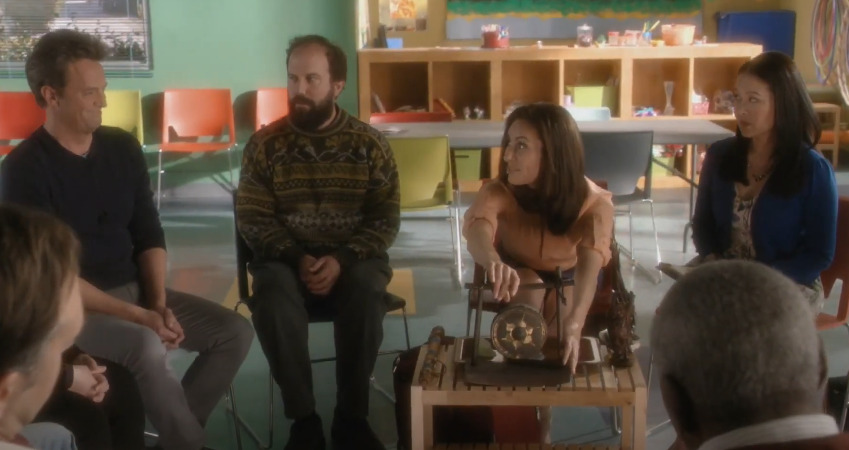Rating: ★★★★★★★
Genre: Comedy, Drama
Starring: Matthew Perry, Laura Benanti, Julie White, Tyler James Williams, Suzy Nakamura, Brett Gelman
When Go On premiered in 2012, it marked another return to TV for Matthew Perry, and this time he brought a unique blend of comedy and heart. Created by Scott Silveri, a Friends alum, Go On TV series tells the story of Ryan King, a star sports radio host struggling to find purpose and joy after the unexpected death of his wife. Through his journey in a grief support group, the show explores loss and healing with humor, sensitivity, and the undeniable charm Matthew Perry brings to the screen.
Plot Summary
Ryan King (Matthew Perry) is a man who hides his grief beneath sarcasm and wit, a character style that suits Perry well. Though he initially joins the support group only because his boss insists, Ryan soon realizes that the group offers something his career and friends can’t: a space to be vulnerable. Each group member brings a unique and often quirky perspective on loss, from Fausta’s anger over losing family to Anne’s sorrowful resilience after her partner’s death. Together, they form an unlikely but endearing family, gradually helping each other come to terms with their pain and rediscover joy.
The Cast: A Diverse Ensemble with Great Chemistry
One of this show’s greatest strengths is its ensemble cast, who bring humor and depth to each character. Julie White shines as Anne, a tightly wound lawyer who shares some of Ryan’s sardonic outlook. Tyler James Williams as Owen, the young man who’s lost a brother, and Brett Gelman as the socially awkward Mr. K, add layers of complexity and humor to the group. Laura Benanti’s portrayal of Lauren, the group’s slightly inexperienced but well-meaning counselor, balances charm and insight. Their chemistry with our lead actor brings a sense of real camaraderie that makes the support group feel authentic and grounded.

Matthew Perry’s Performance: From Grief to Growth
Perry’s portrayal of Ryan feels deeply relatable, blending comedy with heartfelt moments of vulnerability. He handles the character’s grief and humor in a way that feels true to life, capturing both the reluctance to confront pain and the slow process of healing. Perry’s wit shines as he navigates the group’s unique personalities, often becoming the humorous voice of reason amidst their eccentricities. His performance stands out not only for its comedic timing but also for its emotional sincerity—a trait that makes Ryan King one of Perry’s most memorable characters outside of Friends.
Balancing Comedy and Emotion
Go On strikes a careful balance between laughter and genuine emotion. It doesn’t shy away from the reality of grief but instead approaches it with a warmth and levity that many viewers found refreshing. By blending humor with heartfelt moments, the show manages to be both uplifting and comforting, reminding audiences that laughter and healing often go hand in hand.
However, one of the challenges this TV series faces is occasionally veering into predictability. Some of the group’s bonding moments feel a bit formulaic. And, the show’s focus on healing through humor may not appeal to viewers seeking a deeper, more dramatic exploration of grief. Nevertheless, the lighter approach allows Go On to stand out as a hopeful, feel-good TV series.
The Show’s Legacy: An Underrated Gem
Despite receiving positive reviews, Go On struggled to find a large audience and was canceled after just one season. Its cancellation left fans disappointed, as the show’s genuine, feel-good charm and unique look at mental health had the potential for much more development. In many ways, it remains an underrated gem that fans of Matthew Perry and character-driven comedies will appreciate.
My Final Thoughts
Go On may not have achieved the cult status of Friends, but it showcases a different side of Matthew Perry’s talent and adds a unique entry to his television career. With Perry at its center, the show offers humor, warmth, and a sincere exploration of loss that feels both comforting and entertaining. For fans looking for a lighter, more humorous take on overcoming life’s hardships, Go On is a hidden gem worth discovering.
Cultural Resonance with Indian Audiences
While this show offers a poignant and humorous exploration of grief through its ensemble cast, Indian viewers might find the show’s central theme of mental health support through group therapy a bit distant. Despite significant strides in mental health awareness globally, the concept remains nascent in many parts of India where traditional norms often govern emotional expressions and coping mechanisms. This cultural disparity might lead some Indian audiences to feel disconnected from the show’s core narrative, as the openness about personal struggles depicted in Go On isn’t widely mirrored in Indian society.
Personally, I found myself grappling with this cultural disconnect, which made it challenging to fully engage with the series. The show’s focus on therapy and mental wellness, portrayed as a communal journey of healing, stands in stark contrast to the often solitary struggle many Indians face when dealing with grief and mental health issues. This not only impacts viewer relatability but also reflects the broader dialogue—or lack thereof—about mental health in Indian contexts. For those navigating similar cultural landscapes, this aspect of Go On serves as both a window into alternate approaches to mental health and a mirror reflecting the silence around such topics back home.
The World of Movies Rating of the show: 7/10!
Note: “The images used in this article are screenshots taken from YouTube and have been converted into images using Canva, Gemini and ChatGPT tools for the purpose of this article only. The World of Movies acknowledges that it does not hold any proprietary rights over the images and that their use is solely for the purpose of this article.”
